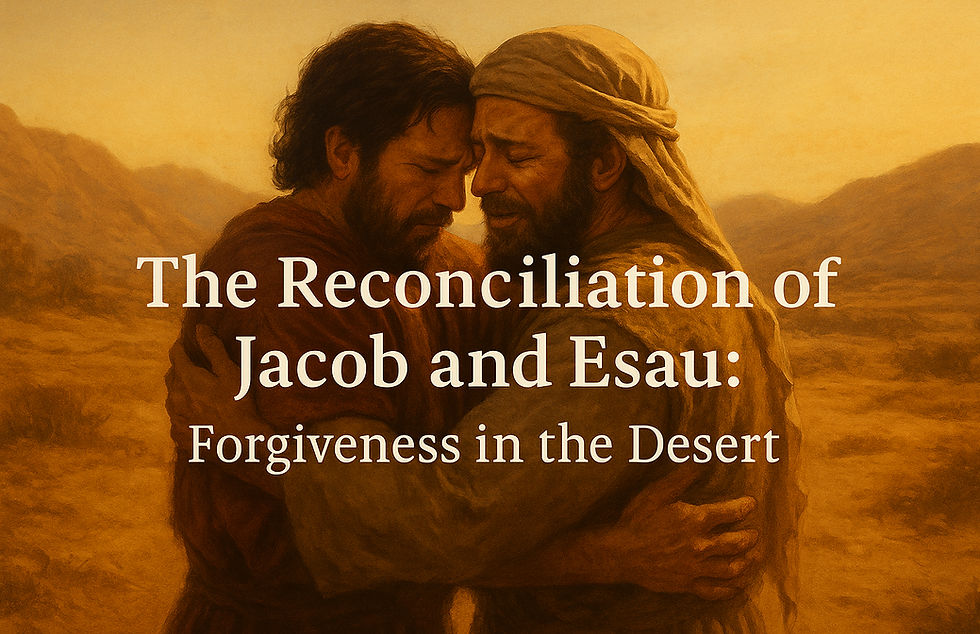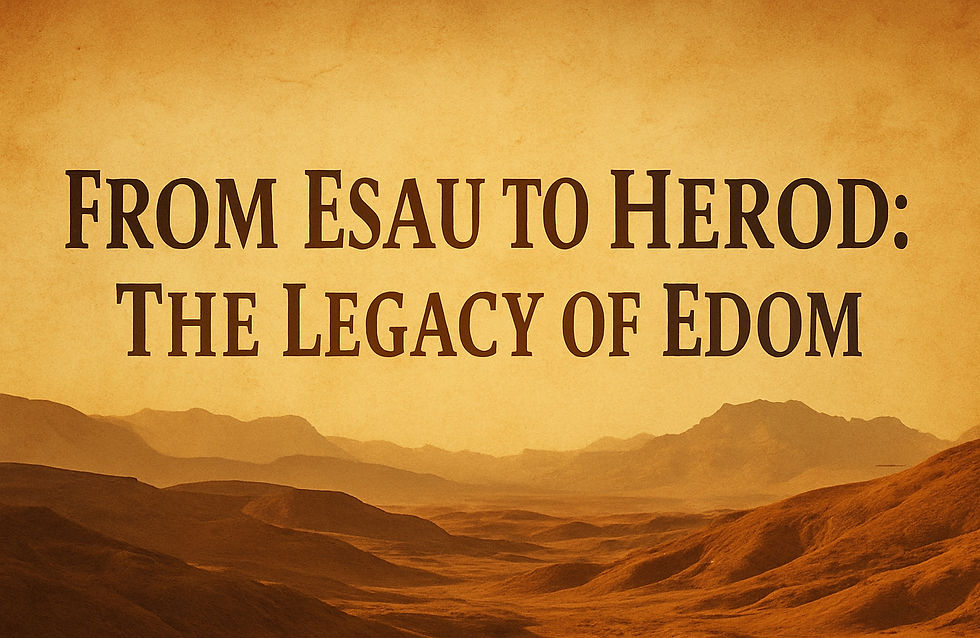Esau: The Man Who Sold His Birthright
- Bible Believing Christian

- Sep 4
- 4 min read

Esau: The Man Who Sold His Birthright
Esau, the elder son of Isaac and Rebekah, is remembered in Scripture as the man who traded his inheritance for a single meal. His life embodies the tension between immediate desires and eternal promises, and his legacy illustrates both the consequences of disregarding God’s covenant and the possibility of reconciliation. Though he became the father of the Edomites, often at odds with Israel, Esau’s story remains a cautionary tale about valuing God’s blessings rightly.
Name & Etymology
The name Esau (עֵשָׂו, ʿĒśāw, pronounced ay-sawv) means “hairy,” reflecting his physical appearance at birth (Genesis 25:25). He is also called Edom (אֱדוֹם, ʾĔḏôm), meaning “red,” because of the red stew for which he sold his birthright (Genesis 25:30). In the Septuagint, his name is rendered Esau (Ἠσαῦ).
Biblical Narrative (The Story)
Esau and Jacob were twins born to Isaac and Rebekah. Even in the womb, they struggled together, fulfilling God’s prophecy: “The sons in your womb will become two nations. From the very beginning, the two nations will be rivals. One nation will be stronger than the other; and your older son will serve your younger son” (Genesis 25:23, NLT).
At birth, Esau emerged first, red and hairy, while Jacob followed grasping his heel (Genesis 25:25–26). Esau grew to be a skilled hunter, a man of the outdoors, while Jacob was more quiet and domestic. Isaac favored Esau, while Rebekah favored Jacob (Genesis 25:27–28).
The Birthright Sale (Genesis 25:29–34)
One day, Esau returned famished from hunting and found Jacob cooking stew. In desperation, he sold his birthright—the inheritance rights of the firstborn—for bread and lentil stew. “Esau swore an oath, thereby selling all his rights as the firstborn to his brother, Jacob” (Genesis 25:33, NLT). Scripture comments: “Esau showed contempt for his rights as the firstborn” (Genesis 25:34, NLT).
The Lost Blessing (Genesis 27)
Later, when Isaac was old and nearly blind, Rebekah helped Jacob deceive him into giving Jacob the blessing reserved for Esau. When Esau discovered what had happened, he wept bitterly: “Oh my father, what about me? Bless me, too!” (Genesis 27:34, NLT). Though Isaac gave him a secondary blessing, Esau’s resentment grew, and he plotted to kill Jacob.
Later Reconciliation (Genesis 33)
Despite years of animosity, when Jacob returned to Canaan, Esau greeted him not with violence but with forgiveness. “Esau ran to meet him, embraced him, threw his arms around his neck, and kissed him. And they both wept” (Genesis 33:4, NLT). Their reconciliation shows that Esau, though flawed, was capable of mercy.
Esau later settled in the hill country of Seir, and his descendants became the nation of Edom (Genesis 36).
Historical & Cultural Context
As the firstborn, Esau held the birthright, which included a double share of inheritance and leadership of the family line. In the covenant context, this also meant carrying forward God’s promises given to Abraham and Isaac. By selling his birthright, Esau demonstrated disregard for the covenant.
The Edomites, his descendants, lived in the territory of Seir and often conflicted with Israel. At times they opposed Israel’s passage (Numbers 20:14–21), and later prophets condemned Edom’s hostility (Obadiah). Yet their origins trace back to Abraham through Esau, making them both kin and rival to Israel.
Character & Themes
Esau is portrayed as passionate, impulsive, and earthy. He valued the immediate over the eternal, showing contempt for spiritual inheritance. Yet he was also capable of forgiveness, as seen in his reconciliation with Jacob.
Themes from his life include:
Immediate gratification vs. eternal blessing: Esau traded the lasting for the temporary.
Favoritism in families: His story reflects the destructive impact of Isaac and Rebekah’s divided favoritism.
Conflict and reconciliation: Though Jacob and Esau struggled, their reunion shows the possibility of peace.
Connection to Christ
Esau represents the danger of despising God’s inheritance, contrasting with Christ, who endured suffering for the joy set before Him (Hebrews 12:2). The New Testament warns: “Make sure that no one is immoral or godless like Esau, who traded his birthright as the firstborn son for a single meal” (Hebrews 12:16, NLT).
Christ, unlike Esau, did not grasp at temporary relief but willingly suffered to secure the eternal inheritance for His people.
Theological Significance
Esau’s story underscores God’s sovereignty in election. Before the twins were born, God declared that the older would serve the younger (Genesis 25:23; Romans 9:10–13). This was not based on works but on God’s plan.
His life also warns against despising spiritual inheritance. To treat God’s promises lightly, as Esau did, is to trade the eternal for the fleeting.
Myths & Misconceptions
One misconception is that Esau was cursed. In reality, he received blessing from Isaac, though not the covenant blessing given to Jacob (Genesis 27:39–40).
Another misconception is that Esau was purely wicked. While his contempt for the birthright was serious, his later forgiveness of Jacob shows complexity in his character.
A third misconception is that Jacob’s deception robbed Esau unfairly of his destiny. Yet Scripture makes clear that God had already chosen Jacob to carry the covenant. The blessing followed God’s sovereign will.
Application
Esau’s life challenges us to value eternal inheritance over temporary satisfaction. In a world obsessed with instant gratification, his example warns us not to trade God’s blessings for fleeting pleasures.
It also calls us to forgiveness. Though Esau lost his birthright and blessing, his later reconciliation with Jacob demonstrates the healing power of mercy.
Conclusion
Esau, the elder son of Isaac, is remembered as the man who sold his birthright for a meal. His story illustrates the dangers of despising God’s promises and the consequences of living for immediate desires. Yet his reconciliation with Jacob also shows the possibility of forgiveness. His life is a cautionary tale, a mirror of God’s sovereignty, and a reminder to treasure the inheritance we have in Christ.


